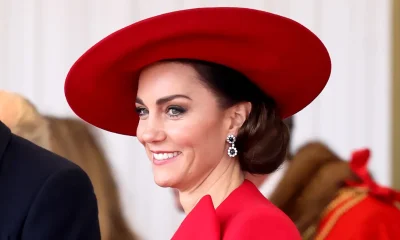Editor's Pick
Arise, Sir David: The Significance of David Beckham’s Knighthood
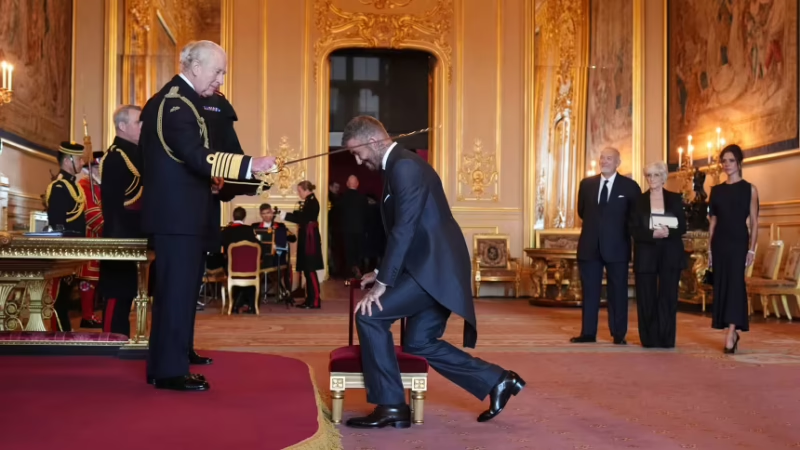
David Beckham has been knighted by King Charles III, in what the retired British soccer star described as his “proudest moment.”
The former England soccer captain accepted the knighthood for his services to sport and charity on Tuesday at a ceremony at Windsor Castle, where Japanese-British author and screenwriter Kazuo Ishiguro, and West End and Broadway star Elaine Paige also received honors.
Beckham was named earlier this year in the King’s Birthday Honours list.
“I’ve been very obviously lucky in my career to have won what I’ve won and done what I’ve done but to receive an honor like this, of a knight, is beyond anything that I ever thought that I would receive,”
Beckham told Britain’s PA Media news agency after the ceremony. “To be honest, a young boy from the east end of London, born in Leytonstone, and here at Windsor Castle, being honored by His Majesty the King – the most important and the most respected institution in the world – it’s quite a moment,” he added.
Beckham was accompanied by his wife, Victoria, who made the suit he wore to accept the award.
The father-of-four said the King had “inspired quite a few” of his looks over the years. “I looked at old pictures of him when he was quite young in morning suits and I was like, ‘OK, that’s what I want to wear,’ so I gave it to my wife and she did it.”
The honor comes more than two decades after the 50-year-old, who represented England in 115 international games and won league titles in four different countries, was appointed an officer of the Order of the British Empire (OBE) by Queen Elizabeth II.
Beckham, who retired from professional soccer in 2013, is also a UNICEF goodwill ambassador. In 2015, he launched the “7” fund to support children at risk of dangers such as the Ebola crisis – a fund named after the number on his Manchester United shirt.
He made a notable return to soccer in 2018 when he was awarded a Major League Soccer franchise in Miami, Florida, and went on to form the football club Inter Miami.
Beckham has a good working relationship with King Charles, having exchanged “beekeeping tips” in the Cotswolds, England, last year, when he became an ambassador for The King’s Foundation.
Editor's Pick
Why India Is Poised to Become the Next Major Power to Recognize Somaliland

After Israel, India Steps Forward: Somaliland Emerges as New Pivot in the Indian Ocean.
India is quietly emerging as the most likely next major power to recognize the Republic of Somaliland—and the logic behind the shift is strategic, maritime, and unmistakably geopolitical.
As New Delhi accelerates its push for influence across the Western Indian Ocean and Red Sea, Somaliland has moved from the margins of India’s Africa policy to its center. The driver is not ideology, but competition—above all with China.
At the heart of India’s interest lies Berbera Port.
India’s ambitions align neatly with Somaliland’s geography. Somaliland controls an 850-kilometer coastline along the Gulf of Aden, adjacent to one of the world’s most vital shipping corridors. India already deploys anti-piracy warships in these waters. A deeper relationship with Somaliland would transform patrols into presence—and influence into leverage.
The timing matters. Prime Minister Narendra Modi’s recent visit to Addis Ababa reinforced India’s strategic courtship of Ethiopia, Africa’s largest landlocked market and Somaliland’s primary trade partner. Ethiopia is already shifting major volumes of commerce to Berbera under a historic agreement with Hargeisa. For India, access to Ethiopia via Berbera is not a side benefit—it is the prize.
Indian policy institutions have been explicit: Somaliland is a gateway to counter China’s dominance along East Africa’s coast. New Delhi sees Berbera as a potential commercial hub, logistics corridor, and even future naval foothold—one capable of balancing Chinese and Pakistani-linked influence stretching from the Horn to Mozambique and the Congo.
The political case is equally compelling. Somaliland is stable, democratic, and pro-Western—an anomaly in a volatile region. Its capital, Hargeisa, already hosts consulates and liaison offices from key regional and global players. It recognized Taiwan in 2020, absorbing sustained pressure from Beijing without retreat. That stance has earned quiet admiration in New Delhi, which views Somaliland as a natural partner in the broader Indo-Pacific contest.
Trade ties already exist. Somaliland imports pharmaceuticals, machinery, fuel, vehicles, and consumer goods from India, making New Delhi one of its top trading partners by container volume. What is missing is not commerce—but recognition.
India also sees an opportunity to strengthen its relationship with the UAE, a fellow BRICS member and the principal investor behind Berbera’s expansion and free trade zone. The UAE’s role in co-developing the Berbera Corridor with Ethiopia fits neatly into India’s vision of diversified, non-Chinese supply chains across Africa.
Somaliland cannot hold off Chinese pressure indefinitely on its own. If India wants to prevent Beijing from eventually prying Hargeisa away from Taiwan—and absorbing Berbera into China’s maritime orbit—New Delhi must move decisively.
Recognition would do more than secure influence. It would unlock Indian private investment, boost Somaliland’s economy, and offer African states a visible alternative to China’s debt-driven model. In strategic terms, it would mark the beginning of a pax-India along the East African coast.
Israel broke the diplomatic ice. India now stands at the edge of a consequential decision—one that could redefine the balance of power from the Red Sea to the Indian Ocean, with Somaliland at its center.
Editor's Pick
Hassan Sheikh’s Fatal Obsession: Why Somaliland Haunts Him More Than al-Shabaab
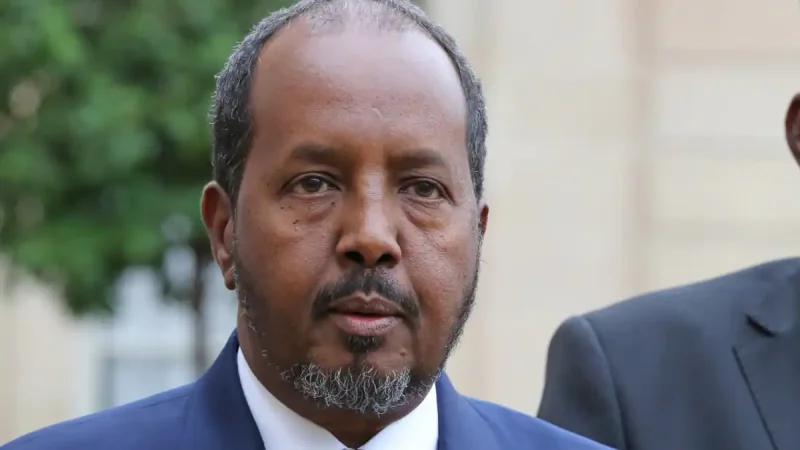
Jealousy in Villa Somalia: Hassan Sheikh’s War Against Somaliland’s Democracy.
Somalia’s President Hassan Sheikh Mohamud has become a prisoner of his own jealousy. Two years into his second term, he has turned Villa Somalia into a war room not against al-Shabaab, famine, or corruption — but against Somaliland’s democracy.
It is the bitter irony of Mogadishu politics: Somaliland has what Hassan Sheikh craves but cannot build. Elections, functioning institutions, stability — the very pillars of a state. And each time Hargeisa strengthens its democracy, Hassan Sheikh’s insecurity deepens. Instead of fixing Somalia’s crumbling foundations, he wastes his energy trying to sabotage Somaliland’s international rise.
Diplomats whisper of a leader consumed by comparison. When Somaliland engages Ethiopia, he panics. When Congress debates travel advisories, he rages. When Somaliland’s army parades discipline, he lashes out with propaganda. It is envy in plain sight.
Meanwhile, Somalia under Hassan Sheikh has become what critics call “Somalia, Inc.” — a company run on begging contracts and aid trips. He has circled the globe signing pledges with Qatar, Turkey, and Egypt, but what has it delivered? More debt, more dependency, and more humiliation. He acts like a traveling salesman while Mogadishu rots under insecurity and corruption.
And yet, he keeps returning to his favorite target: Somaliland. His strategy is one of projection — blame Somaliland, block Somaliland, bury Somaliland. But the more he tries, the more the world notices Hargeisa’s difference. Somaliland is not perfect, but next to Mogadishu’s chaos, it shines.
This obsession is Hassan Sheikh’s fatal flaw. It exposes his weakness, isolates his diplomacy, and leaves Somalia unprepared for the storms ahead. Ethiopia is openly discussing Red Sea access. Egypt and Eritrea are arming Somalia’s fragile government. Al-Shabaab still controls swathes of land. Yet Villa Somalia’s energy is wasted on fighting a neighbor that long ago outpaced it.
The humiliation runs deeper. By attacking Somaliland, Hassan Sheikh admits — without saying it — that Somaliland is real. If it were not, why fear it? Why obsess over it? Why chase every foreign leader to block recognition? His jealousy has become Mogadishu’s foreign policy, and it is destroying him.
And here is the grim prediction: the president after him will be worse. If Somalia survives Hassan Sheikh’s term, it will inherit a broken state, an isolated diplomacy, and an army of resentments. Somaliland, meanwhile, will march on.
Analysis
China’s EUV Breakthrough and the AI Warfare Balance

China’s reported development of a prototype extreme ultraviolet (EUV) lithography machine—a critical piece of technology long monopolized by Western firms—may have implications far beyond commercial competition in chips. Sources say that Chinese scientists, including former engineers from Dutch semiconductor equipment maker ASML, assembled a working EUV prototype capable of generating the extreme ultraviolet light needed to etch the tiny circuits used in advanced semiconductor manufacturing.
This marks a significant step toward Beijing’s goal of self-sufficiency in chip production and could reshape how China participates in the global AI and military competition.
Why EUV Matters for AI and Military Power
EUV lithography machines are essential for producing the most advanced chips that power artificial intelligence models, data centers, and high-performance computing—technologies increasingly central to AI-driven military systems and defense capabilities. These chips are a core enabler of autonomous systems, real-time battlefield decision-making, and advanced signal processing. Without access to EUV, a country is effectively shut out of producing the hardware foundations of cutting-edge AI.
For years, export controls by the United States and its allies have restricted China’s access to EUV machines and advanced AI chips precisely because of their dual-use nature—civilian but also critical for military systems. These controls are intended to slow China’s progress in military applications of AI and maintain Western technological superiority.
China’s first EUV prototype suggests it could circumvent some layers of that control, potentially accelerating its ability to internally produce high-end semiconductors that drive AI advances in both commercial and military domains. While the prototype is not yet producing chips, its ability to generate EUV light is a milestone that many analysts believed was years away.
The AI Arms Race and Global Military Balance
Advanced semiconductors are not a luxury—they are strategic military assets. In modern warfare, AI-enabled systems are proliferating rapidly: autonomous drones, sensor networks, real-time command and control, and predictive analytics all depend on advanced chips. As a result, the race for AI superiority overlaps directly with military competition between major powers. Observers often frame this competition as an “AI Cold War,” in which dominance in AI technology and hardware translates into battlefield advantage, deterrence capability, and geopolitical influence.
If China can develop and mass-produce its own advanced chips using domestic EUV technology, it could narrow the technology gap that has so far given the United States and its allies an edge in military AI applications. That includes everything from autonomous systems to real-time battlefield simulations and secure AI-driven cyber defense. The ability to control this part of the supply chain would reduce China’s vulnerability to export controls and strengthen its position in future conflict scenarios where AI plays a decisive role.
Policy and Strategic Implications
For the United States and its partners, this development raises hard questions about the assumptions underlying current export controls and military planning. To date, U.S. efforts have aimed to contain China’s access to critical semiconductor manufacturing tools and advanced AI hardware, seeing this as fundamental to maintaining a strategic advantage across civilian and defense sectors. That strategy is grounded in the belief that access to high-performance computing and AI chips underpins future battlefield success and strategic deterrence.
However, if China continues to close the technological gap—even incrementally—it could force a recalibration of how export controls, multilateral alliances, and technology policy are employed to maintain an AI lead. This shift could also affect allied nations that currently benefit from U.S. chip technology dominance, pushing them to reassess their own semiconductor strategies and defense modernization plans.
Not a Done Deal—Yet
It is important to emphasize that China’s EUV prototype is still not mass-producing chips and remains far less sophisticated than the machines used by industry leaders like TSMC or Intel. Many technical hurdles remain, particularly in optics and production scalability. Critics also note that successfully generating EUV light, while significant, does not automatically translate into full chipmaking capability.
Nevertheless, the development signals that China’s resolve to master the hardest elements of semiconductor manufacturing is stronger than many analysts had expected—underscoring how semiconductor technology is now inseparable from global competition, economic strategy, and military balance.
Conclusion: A New Dimension of the AI Arms Race
China’s reported EUV prototype does not yet rewrite the rules of the global semiconductor landscape, but it does redefine the timeline and stakes. In an era where artificial intelligence increasingly shapes military strategy and operational capability, control over the hardware that fuels AI is no longer a commercial advantage alone—it is a strategic imperative.
As rivals pursue their own national semiconductor goals, the emergence of China’s EUV capabilities could mark the beginning of a more contested, multipolar era in both technology and military power.
Editor's Pick
Why the U.S. Is Turning Abandoned Prisons into ICE Detention Centers
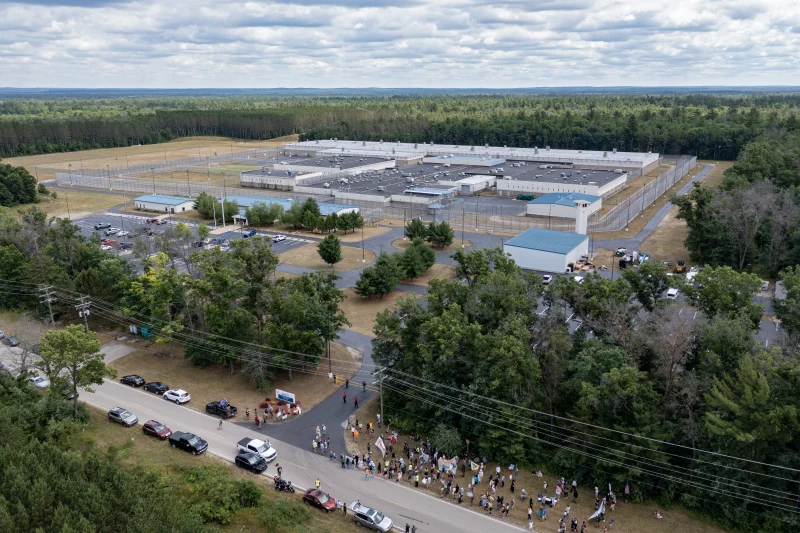
Across the United States, long-shuttered prisons — some with histories of abuse, neglect, and civil rights violations — are being quietly reopened to serve as new detention centers for immigrants under the custody of U.S. Immigration and Customs Enforcement (ICE). What had once been facilities closed by local authorities for failing basic standards are now being repurposed amid a historic surge in immigration enforcement.
The Trump administration has dramatically expanded immigration detention as part of its effort to accelerate deportations and “secure the border,” creating a demand for tens of thousands of additional beds beyond the federal government’s existing infrastructure. To meet that demand, ICE has reportedly turned to private prison companies to reactivate previously inactive facilities that had been mothballed — despite troubling past records.
According to El País, facilities such as the North Lake Correctional Facility in Michigan and the Midwest Regional Reception Center (MRRC) in Kansas have been reopened or are being pressed into service to house migrants, with private operators CoreCivic and GEO Group securing no-bid federal contracts to run them. Those companies have histories of civil rights complaints and oversight failures, raising alarms among activists and human rights groups who say the expansion risks repeating past abuses under a new designation. EL PAÍS English
Critics note that these facilities were closed for reasons including systemic understaffing, dangerous conditions, and, in some cases, documented violence and neglect — conditions that civil liberties organizations fear will resurface once inmates are again confined behind their walls. El País reports that reopening such centers has boosted stocks for CoreCivic and GEO Group even as advocacy groups warn that “cashing in” on immigrant detention escalates a system already under heavy scrutiny.
Local Governments Left in the Dark
In some communities, local officials say they have little information about whether or how these closed prisons might be repurposed. In Colorado, KUNC reported that mayors and county administrators in several towns learned only through news coverage that ICE had expressed interest in reopening shuttered private prisons to detain immigrants. Contracts with private operators, they said, would not require local approval, leaving communities unsure about what might come.
Officials in towns like Walsenburg and Hudson noted they had no direct notice of federal plans, and that private prison companies had approached ICE about potential contracts, but the details remained unclear. In some instances, companies had begun advertising for detention staff positions contingent on facilities being revived — a sign that momentum toward reopening is building even without clear community buy-in.
A Broader Pattern of Expansion
This push to reopen old facilities fits into a larger federal strategy of rapidly expanding detention capacity. ICE has historically relied on private prison companies to provide space beyond what the government operates directly, but the sheer scale of reopened sites and the speed with which they are being repurposed have alarmed advocates. Public records and reporting suggest that ICE already detains most immigrants in facilities run by for-profit contractors with longstanding criticisms for poor treatment and oversight, according to the Brennan Center for Justice and other watchdog organizations.
Civil liberties groups argue that rather than investing in humane alternatives to detention or addressing root causes of migration, the federal government is doubling down on a punitive model that echoes the broader U.S. carceral system. The specter of reopening prisons that had been closed due to poor conditions or community opposition raises questions about whether lessons from past failures have been learned — or simply ignored in the rush to expand capacity.
Human Rights and Policy Implications
With immigration arrests and detention numbers far outpacing historical norms, reopening old prisons signals a shift toward scaling up enforcement infrastructure at a time of sharp debate over immigration policy. Critics worry that the human cost of detention — including inadequate medical care, isolation, and limited oversight — will be repeated if new safeguards are not implemented. Meanwhile, many communities remain largely unaware of how federal decisions will affect local resources and social dynamics.
At the core of the controversy lies a broader question about American values and civil liberties: can a system that expands detention capacity without robust accountability, transparency, and respect for human dignity truly claim to protect the rule of law?
In the process of reopening these shuttered prisons for ICE use, some fear the answer is slipping further away.
Editor's Pick
Ethiopia Sets June 2026 Date for 7th National General Election
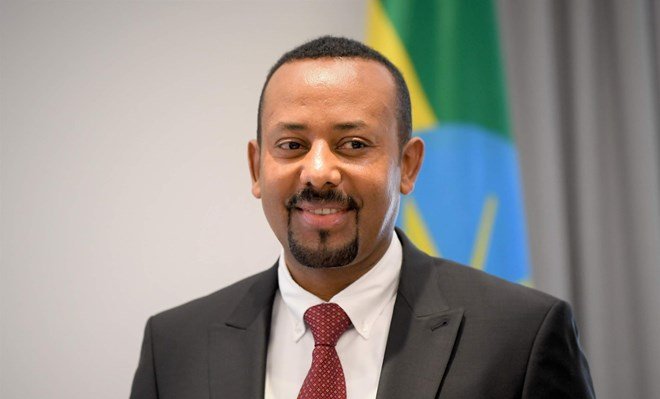
Ethiopia will hold its 7th General Election on June 1, 2026, the National Election Board of Ethiopia (NEBE) announced on Tuesday, marking the formal start of a long electoral cycle in a country still navigating political tension and institutional reform.
NEBE Chairperson Melatwork Hailu said the Board has already launched a series of pre-election preparations aimed at ensuring a more organized and technologically supported process.
Those steps include restructuring branch offices, assessing the readiness of polling stations, and rolling out nationwide training for political parties to help them communicate their platforms effectively to the public.
For the first time, candidate registration will be conducted through a custom-built digital platform, allowing political parties and independent contenders to file their applications online.
Melatwork noted that the transition to digital systems is designed to reduce delays, strengthen verification, and modernize Ethiopia’s electoral infrastructure.
Voter registration will also follow a hybrid model—partially conducted through NEBE’s new software and partially through manual systems to ensure accessibility in areas with limited digital connectivity.
The Board is additionally finalizing a separate digital system to register election observers, a move officials say will expand transparency and improve monitoring during the 2026 vote.
NEBE’s announcement signals an early push to stabilize electoral expectations and give political actors a clear timeline ahead of what is expected to be a pivotal national vote.
Editor's Pick
China Tests Hypersonic Jet Aiming to Circle the Globe in Seven Hours

China Tests Hypersonic Jet Aiming to Circle the Globe in Seven Hours.
China’s aviation ambitions are accelerating at extraordinary speed. The country is developing a hypersonic jet capable of flying at Mach 16 — fast enough to circle the planet in just seven hours — in what could become one of the most dramatic leaps in commercial air travel since the dawn of the jet age.
The aircraft, designed by Beijing-based Lingkong Tianxing, is moving from concept toward reality. The company has already completed successful test flights of its Yunxing prototype at Mach 4, roughly 3,070 mph. Engineers are now conducting advanced trials on a new-generation engine designed to push the aircraft into true hypersonic territory.
If the program advances as planned, long-haul routes would be transformed. A journey such as London to New York — currently an eight-hour transatlantic flight — could be reduced to about 90 minutes, surpassing even the Concorde’s fastest record of under three hours.
Lingkong Tianxing confirmed that its Yunxing demonstrator flew successfully in October, with additional propulsion tests scheduled throughout November. Each step marks incremental progress toward a maiden hypersonic flight, which the company hopes to achieve within the next decade.
A legacy of speed: from Concorde to the hypersonic race
The promise of ultra-fast civilian travel revives a dream that captivated the world half a century ago. The Concorde, operated by British Airways and Air France, was the first and only supersonic passenger jet to enter commercial service.
Flying at Mach 2, it cut transatlantic travel times in half and embodied the pinnacle of Cold War–era aerospace engineering.
But the Concorde also revealed the limits of early supersonic travel. Operating costs were immense, its fuel burn was high, and its sonic booms sharply restricted where it could fly. A deadly crash in 2000, followed by surging fuel prices and weakened demand after 9/11, led to the aircraft’s retirement in 2003.
In the years since, the industry’s push toward supersonic and hypersonic travel has periodically faded and re-emerged. Today, advances in materials science, engine design, and computational aerodynamics have reignited optimism that the next generation of ultra-fast flight may succeed where the Concorde could not.
A global race to the next frontier
China is not alone in the race. Designers such as Oscar Viñals have proposed aircraft capable of exceeding Mach 5. NASA’s X-59 program is experimenting with technologies to dramatically reduce sonic booms.
American firms like Venus Aerospace envision jets that could complete transatlantic routes in under an hour. Meanwhile, Chinese companies like Cormac are working on supersonic aircraft quieter than a car at Mach 1.
But among the many contenders, Lingkong Tianxing’s hypersonic Yunxing project is the most audacious — and the most advanced in real-world testing.
Whether the jet ultimately reaches its proposed Mach-16 capability remains an open question. The technological and regulatory challenges are enormous. Yet the company’s rapid progress signals that a new era of extreme-speed passenger flight may no longer be a distant fantasy.
For now, the Yunxing program stands at the forefront of a high-stakes, global technological race — one that could redefine both military and civilian aviation and fundamentally reshape how the world moves.
Editor's Pick
The New Dubai? Foreigners to Own Prime Saudi Real Estate

Saudi Arabia’s decision to allow foreign nationals to purchase real estate beginning in January 2026 marks one of the most consequential shifts in the Kingdom’s economic strategy in decades, signaling a deeper turn toward global investment and the structural ambitions of Vision 2030.
The policy, which will open designated zones in Riyadh, Jeddah, NEOM and other major development corridors to expatriates and international buyers, represents a calibrated move toward economic liberalization in a country historically defined by strict ownership rules. Properties in Makkah and Madinah will remain governed by special regulations.
Under the government’s timeline, the new law is set to take effect in early 2026, with detailed regulations to be released within six months on the “Istitaa” digital platform. Officials say this window is intended to provide clarity to investors, developers, and financial institutions preparing for what is expected to become one of the world’s largest emerging real estate markets.
The policy aligns with a broader effort to reduce Saudi Arabia’s dependence on oil by drawing long-term foreign capital into the country’s infrastructure and housing sectors.
Property ownership, Saudi officials argue, encourages expatriates to transition from temporary workers to invested residents — deepening the professional class required for expanding industries such as finance, technology, and advanced manufacturing.
A central driver of the reform is the need to attract private investment into the Kingdom’s mega-projects, including NEOM, the Red Sea development, and the rapid transformation of Riyadh.
Opening real estate to foreign ownership converts a previously limited market into a globally tradable asset class, offering new revenue streams for banks, developers, and state-backed projects.
The approach parallels elements of Dubai’s economic model, which ignited a real estate boom when it opened specific zones to international buyers in 2002. Saudi Arabia’s strategy mirrors that playbook: liberalize selectively, preserve sensitive areas, and allow major urban centers to absorb and shape global demand.
The scale, however, is dramatically larger; some economists estimate the long-term potential of Saudi Arabia’s property market at more than $15 trillion.
Still, questions remain. The full impact will hinge on the specifics of the forthcoming regulations — including ownership limits, financing rules, zoning boundaries, and taxes.
The clarity and predictability of these rules will determine whether Riyadh and Jeddah emerge as major global real estate hubs or advance more cautiously as regional centers of investment.
For international executives, asset managers, and institutional investors, the new policy is a signal to begin preparing.
The Kingdom’s real estate sector is transitioning from a protected domestic market to an international investment landscape, introducing opportunities for construction firms, financial institutions, private equity, and residential developers.
Saudi Arabia’s long-term bet is clear: foreign ownership will accelerate economic diversification, draw global talent, and bind international capital to the success of Vision 2030. As the Kingdom continues its rapid transformation, the opening of the property market is poised to become one of the most influential economic reforms of the decade.
Editor's Pick
Hacked, Broke, and Isolated — Somalia’s Federal Dream Turns to Dust

The Collapse of a Mirage: Donor Fatigue Exposes Somalia’s Fake Economy.
The illusion of Mogadishu’s “economic progress” has finally cracked. Somalia’s finance minister has admitted what diplomats have long whispered: without foreign donors, the so-called federal government cannot even fund itself.
For years, Somalia’s officials sold the world a narrative of recovery — polished PowerPoints, aid conferences in Brussels, and endless speeches about “digital transformation.” But the mask is off. The 2025 growth forecast has collapsed from 4 percent to barely 1 percent, a free fall that exposes a truth Somalilanders have known all along: the federal state survives not on governance, but on grants, gimmicks, and global sympathy.
Finance Minister Bihi Iman Egeh told CNBC Arabia that the crash comes after a steep drop in donor aid. In plain words, Somalia’s economy is an empty shell built on handouts. The country’s entire budget — from roads to salaries — depends on the goodwill of foreign governments who are now turning away.
Decades after the war, Mogadishu has not learned to stand. Every ministry depends on an NGO; every project depends on another foreign grant. When donors walk, Somalia falls.
The E-Visa Scandal: A Government That Can’t Guard Its Own Data
The collapse of the federal e-visa system, hacked and humiliated before the world, was not an accident — it was a symptom of a failed state pretending to be digital.
More than 35,000 travelers’ data were leaked, including names, photos, and addresses, while Mogadishu stayed silent for days.
Washington warned citizens directly, bypassing Somalia’s own institutions — a diplomatic slap that said it all: even the U.S. doesn’t trust the system.
And yet, this is the same federal government that tried to block Somaliland’s airspace, disrupt regional travel, and impose illegal digital systems across territories it doesn’t control. The breach turned the tables. The world now sees who is capable — and who is careless.
Donor Patience Has Run Out
Global partners have shifted priorities — Ukraine, Gaza, climate crises. Somalia is no longer the emotional project it once was.
Analysts say donors have grown tired of funding corruption disguised as reform. Billions have flowed into Mogadishu, yet poverty deepens, youth flee, and infrastructure barely exists.
As the flow of dollars dries up, Mogadishu’s officials panic, hiding behind slogans of modernization. The Finance Minister himself admitted domestic tax reforms increased revenue “from a very low base.” Translation: nothing significant.
Meanwhile in Hargeisa…
Across the Gulf of Aden, a different story unfolds. Somaliland — unrecognized but self-reliant — continues to run balanced budgets, secure borders, and deliver what Mogadishu only advertises: real governance.
Its coast guards train with Western partners. Its peace endures without a cent from foreign troops. Its institutions function without begging for debt forgiveness or donor pity.
While Mogadishu blames the world, Somaliland builds.
While Somalia collapses under fake federalism, Somaliland stands on fiscal discipline, national unity, and quiet competence — the very ingredients that donors wish Mogadishu had.
The Verdict
Somalia’s looming financial crash is not just an economic headline; it’s a moral one.
A country that refuses to govern itself cannot ask others to keep paying its bills.
And a government that spies, hacks, and fails at basic administration cannot claim to represent a region that has already moved on.
As 2025 begins, the difference is now undeniable:
-
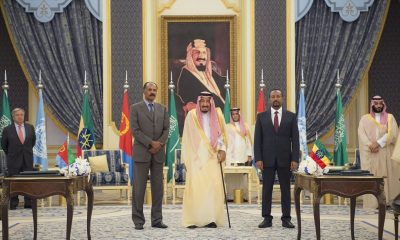
 Analysis10 months ago
Analysis10 months agoSaudi Arabia’s Billion-Dollar Bid for Eritrea’s Assab Port
-

 Opinion17 years ago
Opinion17 years agoSomaliland Needs a Paradigm Change: Now or Never!
-

 Interagency Assessment4 weeks ago
Interagency Assessment4 weeks agoTOP SECRET SHIFT: U.S. MILITARY ORDERED INTO SOMALILAND BY LAW
-

 Somaliland3 months ago
Somaliland3 months agoSomaliland Recognition: US, UK, Israel, and Gulf Bloc Poised for Historic Shift
-
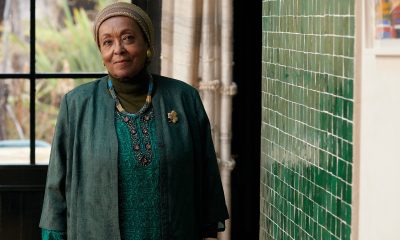
 EDITORIAL1 year ago
EDITORIAL1 year agoDr. Edna Adan Champions the Evolving Partnership Between Somaliland and Ethiopia
-
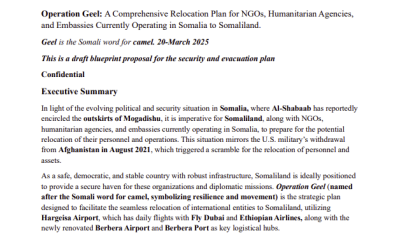
 ASSESSMENTS10 months ago
ASSESSMENTS10 months agoOperation Geel Exposes the Truth: International Community’s Reluctance to Embrace Somaliland as a Strategic Ally
-
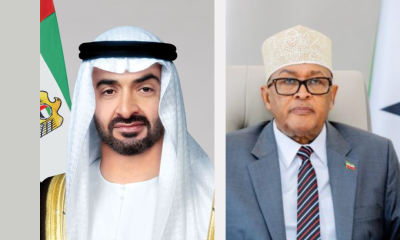
 Somaliland12 months ago
Somaliland12 months agoSomaliland and UAE Elevate Ties to Comprehensive Strategic Partnership
-
Top stories2 years ago
Ireland, Norway and Spain to recognize Palestinian state




